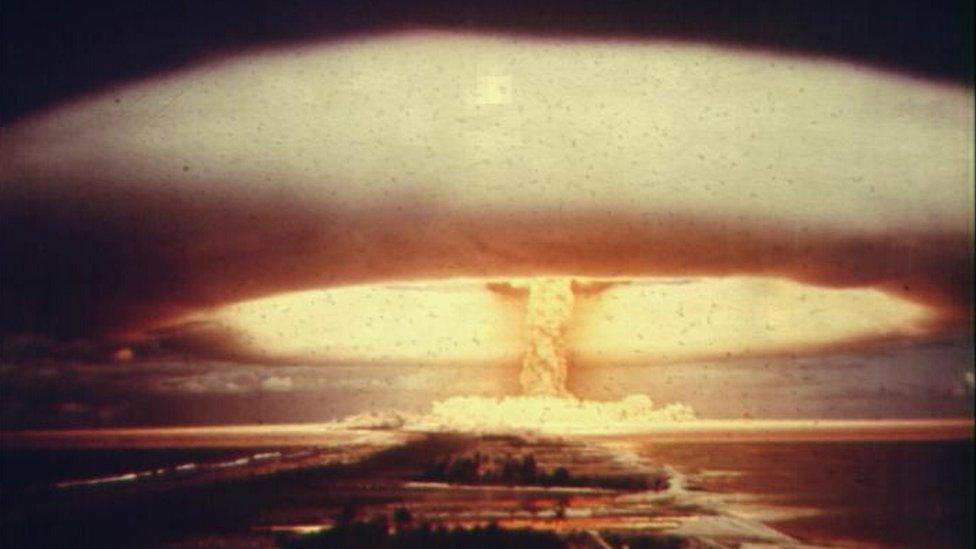Who, What, Why: What would the radio broadcast in a nuclear war?
- Published

BBC newsreader Peter Donaldson, who has died aged 70, was to have been the voice of radio bulletins in the event of a nuclear attack. What would have gone out on the UK's airwaves if the Cold War had turned hot?
"This is the Wartime Broadcasting Service. This country has been attacked with nuclear weapons. Communications have been severely disrupted, and the number of casualties and the extent of the damage are not yet known."
So began the script, read by Peter Donaldson, which was to go out on British airwaves in the event of nuclear war.
The Wartime Broadcasting Service was run by the BBC on behalf of the government. It was intended to replace existing radio broadcasts in the event of a nuclear exchange.
According to declassified papers, the recording of Donaldson would have been broadcast from a nuclear bunker at Wood Norton in Worcestershire and transmitted from nearby Droitwich.
The script urged people to stay calm, remain in their homes, save water and make the most of tinned food supplies. It was hoped this would provide reassurance as well as information.
"If there had been a nuclear attack, people would still have heard the BBC and hopefully they would have taken heart," Michael Hodder, who ran the Wartime Broadcasting Service, told the BBC's The One Show in September.
An excerpt from the late Peter Donaldson's broadcast in the event of a nuclear attack
The service would also be used to make official government announcements. It was intended that there would also have been regional services performing similar functions for regional seats of government.
BBC staff would have followed procedures set out in the War Book, a Cold War instruction manual that was declassified in 2009. "Engineers in charge of transmitters had it in their safes," says BBC historian Jean Seaton.
Initially it was planned that music and light entertainment programmes including Hancock's Half Hour, Round the Horne and Just A Minute would be broadcast too, but by the 1980s it was decided that only official announcements would be transmitted to preserve energy.
The use of a well-known presenter was considered crucial. In a June 1974 letter, Harold Greenwood from the Ministry of Posts and Telecommunications warned that an "unfamiliar voice" would lead listeners to conclude that "perhaps after all the BBC has been obliterated".
Full script
This is the Wartime Broadcasting Service. This country has been attacked with nuclear weapons. Communications have been severely disrupted, and the number of casualties and the extent of the damage are not yet known. We shall bring you further information as soon as possible. Meanwhile, stay tuned to this wavelength, stay calm and stay in your own homes.
Remember there is nothing to be gained by trying to get away. By leaving your homes you could be exposing yourselves to greater danger. If you leave, you may find yourself without food, without water, without accommodation and without protection. Radioactive fall-out, which follows a nuclear explosion, is many times more dangerous if you are directly exposed to it in the open. Roofs and walls offer substantial protection. The safest place is indoors.
Make sure gas and other fuel supplies are turned off and that all fires are extinguished. If mains water is available, this can be used for fire-fighting. You should also refill all your containers for drinking water after the fires have been put out, because the mains water supply may not be available for very long. Water must not be used for flushing lavatories: until you are told that lavatories may be used again, other toilet arrangements must be made. Use your water only for essential drinking and cooking purposes. Water means life. Don't waste it.
Make your food stocks last: ration your supply, because it may have to last for 14 days or more. If you have fresh food in the house, use this first to avoid wasting it: food in tins will keep. If you live in an area where a fall-out warning has been given, stay in your fall-out room until you are told it is safe to come out. When the immediate danger has passed the sirens will sound a steady note. The "all clear" message will also be given on this wavelength. If you leave the fall-out room to go to the lavatory or replenish food or water supplies, do not remain outside the room for a minute longer than is necessary.
Do not, in any circumstances, go outside the house. Radioactive fall-out can kill. You cannot see it or feel it, but it is there. If you go outside, you will bring danger to your family and you may die. Stay in your fall-out room until you are told it is safe to come out or you hear the "all clear" on the sirens.
Here are the main points again: Stay in your own homes, and if you live in an area where a fall-out warning has been given stay in your fall-out room, until you are told it is safe to come out. The message that the immediate danger has passed will be given by the sirens and repeated on this wavelength. Make sure that the gas and all fuel supplies are turned off and that all fires are extinguished. Water must be rationed, and used only for essential drinking and cooking purposes. It must not be used for flushing lavatories. Ration your food supply: it may have to last for 14 days or more.
We shall repeat this broadcast in two hours' time. Stay tuned to this wavelength, but switch your radios off now to save your batteries until we come on the air again. That is the end of this broadcast.
Subscribe to the BBC News Magazine's email newsletter to get articles sent to your inbox.